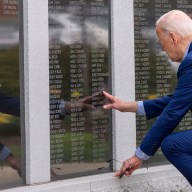BERN, Switzerland – Roman Polanski was declared a free man on Monday after Switzerland rejected a U.S. request to extradite him to be sentenced for having sex in 1977 with a 13-year-old girl.
The Swiss government blamed the decision on U.S. authorities, saying they had failed to address defence arguments that the 76-year-old filmmaker had actually served his sentence before fleeing Los Angeles three decades ago.
Nine months after arresting Polanski, the Justice Ministry said U.S. officials should have backed up their request by providing confidential testimony about Polanski’s sentencing procedure in L.A.
“Mr. Polanski can now move freely,” Justice Minister Eveline Widmer-Schlumpf declared. “He’s a free man.”
The stunning decision could end the United States’ long pursuit of Polanski. France, where he has spent much of his time, does not extradite its own citizens and Polanski has had little trouble travelling throughout Europe — even if he’s stayed away from Britain.
The U.S. cannot appeal the decision, but Polanski is still a fugitive in the United States.
“That warrant remains outstanding,” Los Angeles Superior Court spokesman Allan Parachini said, adding that Polanski could be arrested and sent back to the U.S. if he travelled to another country that has an extradition deal with the United States.
The U.S. Justice Department declined to comment on its next steps.
The Swiss decision was praised by senior government officials in France and Poland, where he holds dual citizenship. But there was criticism from groups representing victims of sexual abuse.
The Oscar-winning director of “Rosemary’s Baby,” ”Chinatown” and “The Pianist” was accused of plying his victim with champagne and part of a Quaalude during a 1977 modeling shoot and raping her. He was initially indicted on six felony counts, including rape by use of drugs, child molesting and sodomy, but pleaded guilty to one count of unlawful sexual intercourse.
In exchange, the judge agreed to drop the remaining charges and sentence him to prison for a 90-day psychiatric evaluation. However, he was released after 42 days by an evaluator who deemed him mentally sound and unlikely to offend again. The judge responded by saying he was going to send Polanski back to jail for the remainder of the 90 days and that afterward he would ask Polanski to agree to a “voluntary deportation.” Polanski then fled the country on the eve of his Feb. 1, 1978, sentencing.
The Swiss government’s main argument concerned confidential testimony given on Jan. 26 by Roger Gunson, the Los Angeles attorney in charge of the original prosecution against Polanski. The Swiss asked for the transcript, but Washington rejected the request.
Based on references to Gunson’s testimony in U.S. courts, the Swiss said it “should prove” that Polanski served his sentence after undergoing the diagnostic study.
“If this were the case, Roman Polanski would actually have already served his sentence and therefore both the proceedings on which the U.S. extradition request is founded and the request itself would have no foundation,” the ministry said.
The Justice Ministry said its decision reflected the spirit of the law, as U.S. authorities hadn’t pursued Polanski in Switzerland previously even though he’s often visited the country and bought a house here in 2006. It also cited the wishes of the victim, Samantha Geimer, who long ago publicly identified herself and has joined in Polanski’s bid for dismissal.
Polanski’s electric monitoring bracelet was removed, the government said, but it was unclear if he had already left the confines of his house and garden for the first time since being placed under house arrest in December on $4.5 million bail.
A woman who answered the door said Polanski had left. The director’s France-based lawyer, Herve Temime, told The Associated Press by telephone from his office in Paris that his client was still at his chalet but was now ready to enjoy his freedom.
Approving extradition had seemed the likeliest scenario after Polanski was arrested on Sept. 26 as he arrived in Zurich to receive a lifetime achievement award from a film festival. Polanski had also suffered a series of legal setbacks this year in California courts, and Switzerland only rejects about 5 per cent of the 200 extradition requests it handles annually.
“This decision was certainly not expected,” Temime said, praising Swiss authorities for making the responsible decision.
Peter Cosandey, a former Zurich prosecutor, said complete evidence isn’t normally required in extradition decisions. But this case might have been different because of Polanski’s confused sentencing procedure, he said.
“We in Switzerland do not know, and that’s why the government sought the transcript of Gunson,” Cosandey said. “In extraditions, there are formalities that must be fulfilled. One is whether the person has already served his sentence.”
Widmer-Schlumpf said this decision was not meant to excuse Polanski’s crime, saying the issue was “not about deciding whether he is guilty or not guilty.”
The government said extradition had to be rejected “considering the persisting doubts concerning the presentation of the facts of the case.”
Beyond the legal confusion, Polanski’s extradition was complicated and diplomatically sensitive because of Polanski’s status as a cultural icon in France and Poland, where he holds dual citizenship, and his history as a Holocaust survivor whose first wife was murdered by crazed followers of cult leader Charles Manson in California.
Widmer-Schlumpf said she hoped the decision wouldn’t harm Swiss relations with Washington. The two countries have bickered in recent years over wealthy Americans hiding their money in the biggest Swiss bank, UBS AG, but have co-operated well on resettling prisoners at Guantanamo Bay, Cuba.
“These were three completely different cases that have to be treated completely differently,” Widmer-Schlump said.
___
Klapper reported from Geneva. AP correspondent Angela Charlton in from Paris and AP Entertainment Writer Anthony McCartney in Los Angeles contributed to this report.














